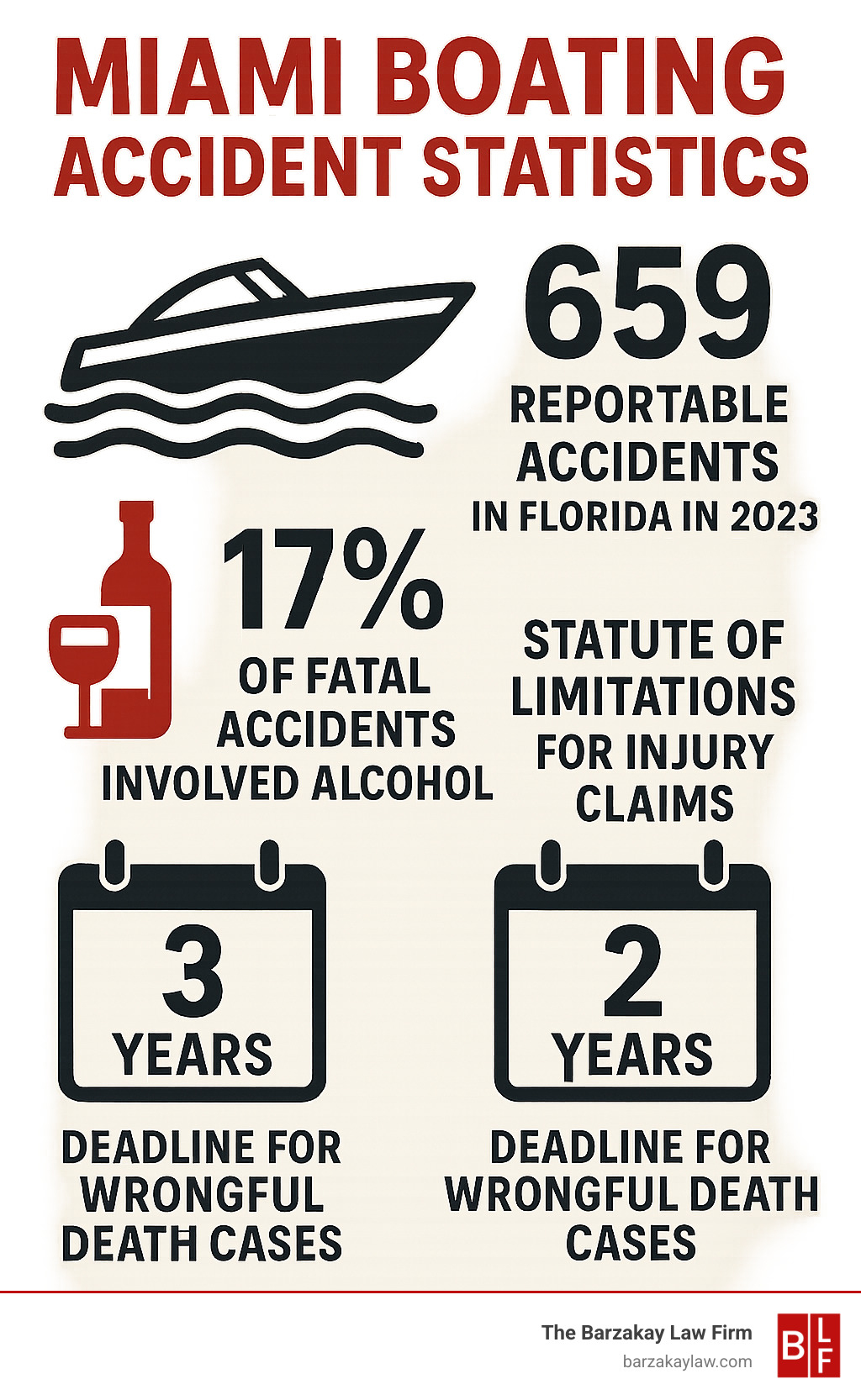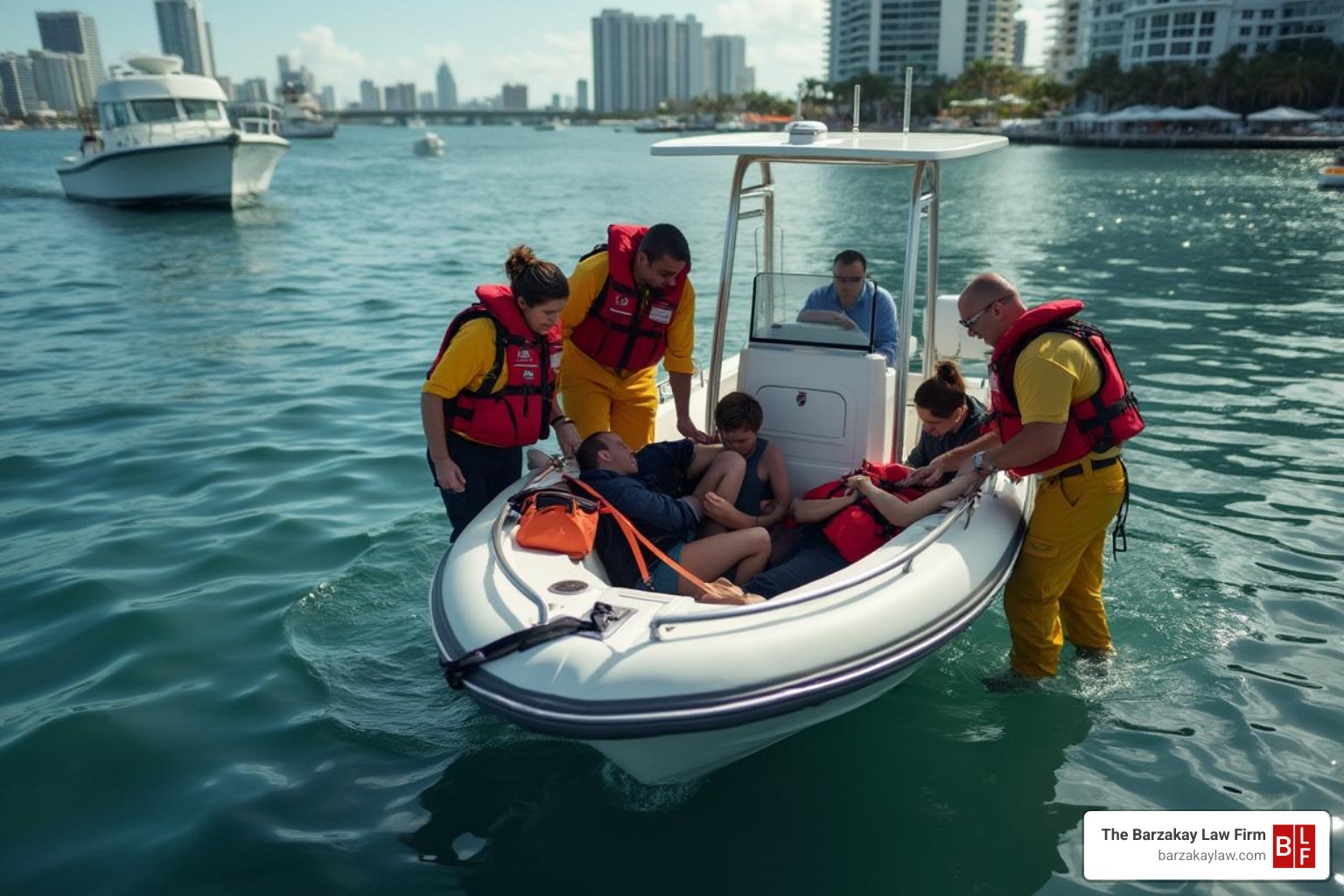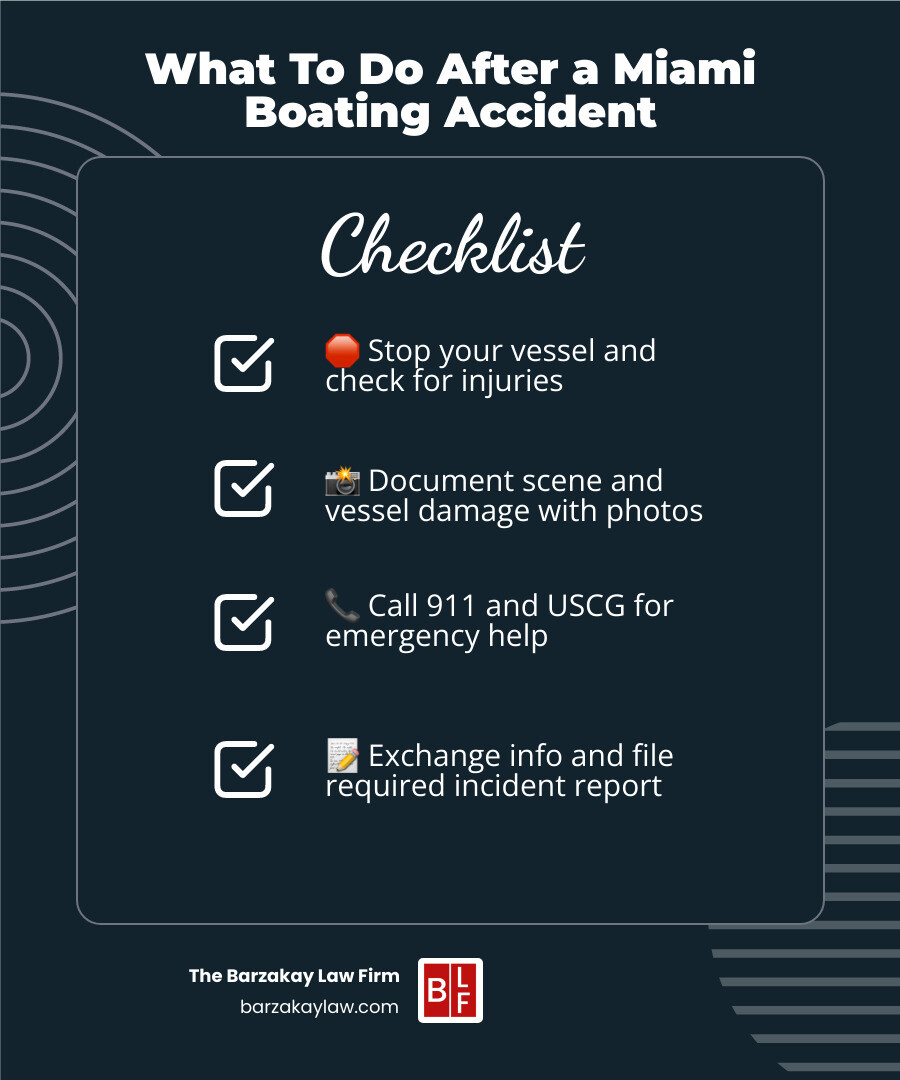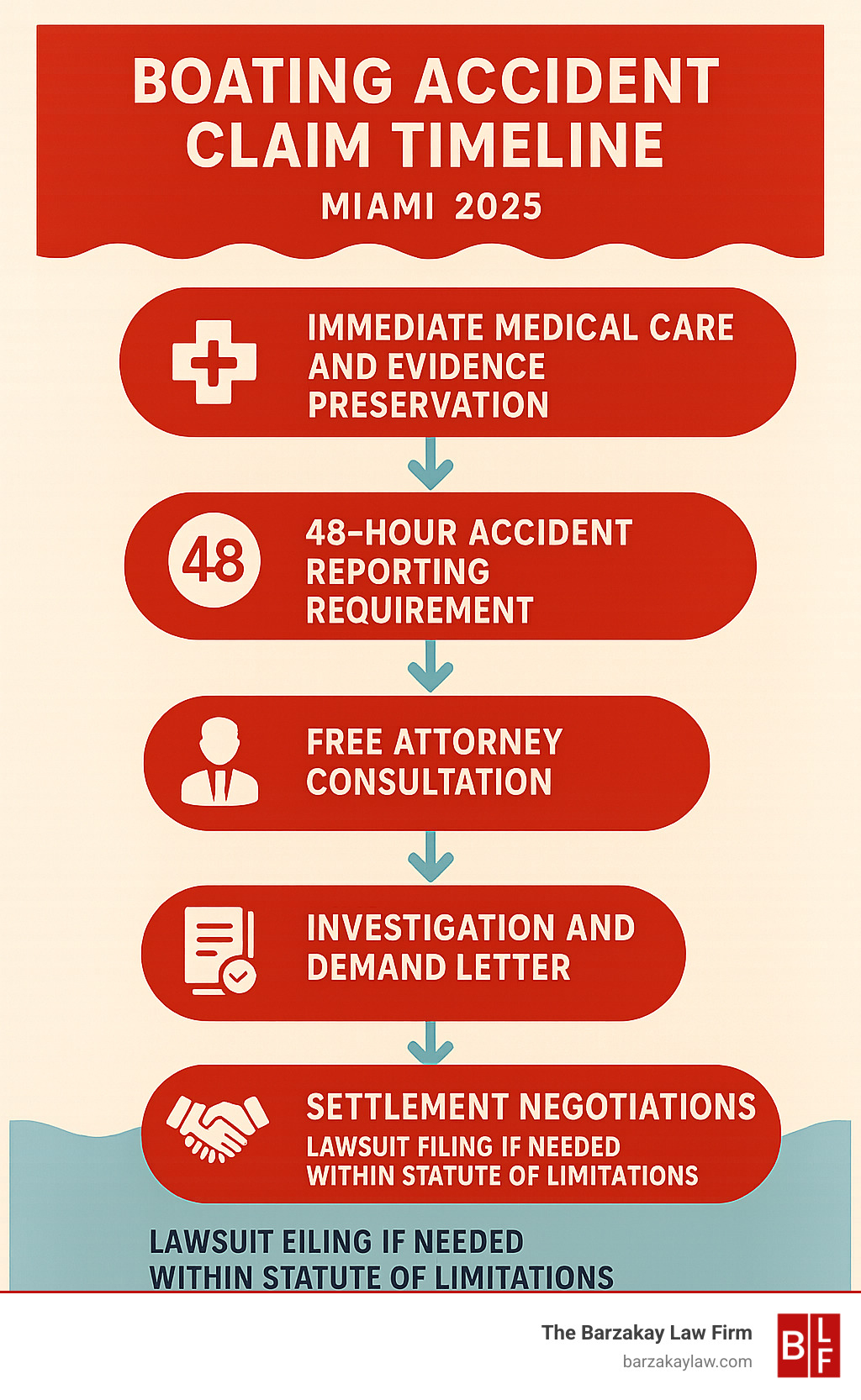Why Miami’s Waters Make Boating Accidents a Serious Legal Matter
When you need a boating accident attorney in miami, you’re likely facing one of the most challenging times in your life. Florida leads the nation in recreational boating accidents, with 659 reportable incidents in 2023 alone according to the Florida Fish and Wildlife Conservation Commission.
Quick Answer: Finding the Right Miami Boating Accident Attorney
- Experience with maritime law – Federal and state regulations differ significantly
- Proven track record – Look for attorneys who have handled similar cases successfully
- No upfront costs – Most work on contingency (you only pay if you win)
- Local knowledge – Understanding of Miami-Dade waterways and local courts
- Immediate action – Florida has strict deadlines (3 years for injury, 2 years for wrongful death)
Miami’s year-round boating season and nearly one million registered vessels create unique dangers. The U.S. Coast Guard reports that alcohol was the primary factor in 17% of all fatal boating accidents nationwide in 2023. With Miami’s busy waterways stretching from Biscayne Bay to the Atlantic Ocean, accidents involving collisions, groundings, and propeller strikes happen far too often.
The complexity of maritime law makes these cases different from typical car accidents. Both federal admiralty law and Florida state regulations may apply to your situation. Insurance companies know this complexity works in their favor when victims try to handle claims alone.
Whether you’re dealing with serious injuries, mounting medical bills, or the tragic loss of a loved one, understanding your legal options is crucial. The right attorney can mean the difference between a quick settlement that barely covers your expenses and full compensation that addresses your long-term needs.

Basic boating accident attorney in miami glossary:
Understanding Boating Accidents on Miami Waters
Miami’s waterways create a perfect storm of conditions that lead to serious boating accidents. When you’re out on Biscayne Bay or navigating the busy channels near the Port of Miami, you’re sharing the water with everything from weekend jet skiers to massive cruise ships. Florida Fish and Wildlife Conservation Commission reports show operator inattention as the leading cause of accidents, with alcohol use and inexperience close behind.
In 2023, the U.S. Coast Guard documented 2,296 boating accidents nationwide, resulting in 1,492 injuries and 250 fatalities. The Latest Coast Guard statistics reveal that collisions between recreational vessels remain the most common type of accident, followed by boats hitting fixed objects and running aground.
What makes Miami particularly dangerous is the sheer variety of waterways. You might start your day in the shallow waters of Biscayne Bay, where a moment’s distraction can send you into a sandbar, then find yourself navigating busy shipping channels where commercial vessels have the right of way.
Common Causes of Miami Boating Accidents
Operator inattention and distraction top the list for good reason. Miami’s beautiful scenery can be captivating, but taking your eyes off the water for even a few seconds can be deadly.
Inexperience and lack of training cause countless accidents every year. Florida doesn’t require boating education, which means many operators learn on the job without understanding navigation rules or weather patterns.
Excessive speed and reckless operation turn minor incidents into major tragedies. In congested areas like the Intracoastal Waterway, speed limits exist for a reason.
Weather-related incidents catch many boaters off guard. Florida’s afternoon thunderstorms can appear within minutes, turning calm waters into dangerous conditions.
Equipment failure and poor maintenance contribute to accidents when boat owners neglect regular upkeep. Faulty steering systems, defective engines, and inadequate safety equipment can all lead to catastrophic failures.
Typical Injuries Sustained on the Water
Boating accidents often result in severe, life-changing injuries because of the forces involved and the marine environment. Unlike car accidents where you have seatbelts and airbags, boats offer little protection when things go wrong.
Traumatic brain injuries happen when passengers are thrown from vessels or when boats collide at high speeds. These injuries can cause lasting cognitive problems and require years of rehabilitation.
Spinal cord damage frequently occurs in boat collisions, particularly when vessels hit each other head-on. These injuries can lead to paralysis or permanent disability.
Severe lacerations and burns result from propeller strikes and fuel fires. Propeller accidents cause devastating cuts that often require multiple surgeries.
Drowning and near-drowning incidents remain tragically common. Statistics show that 88% of drowning victims in boating accidents weren’t wearing life jackets.
Amputations and crush injuries occur when passengers get caught between vessels or struck by propellers. These traumatic injuries often happen so quickly that there’s no time to react.
Essential Steps to Take Immediately After a Boat Crash
The moments right after a boating accident can feel overwhelming, but your actions during this critical time will protect both your safety and your legal rights. Think of it as following a life-saving checklist that could make all the difference in your recovery.

Stop your vessel immediately – this isn’t just common sense, it’s federal law. Leaving the scene of a boating accident can land you in serious legal trouble, even if you weren’t at fault.
The next priority is rendering aid to anyone who needs help. Check everyone for injuries, starting with the most seriously hurt. If someone is unconscious or badly injured, call 911 and the U.S. Coast Guard right away.
You need medical attention even if you feel fine. Adrenaline masks pain and serious injuries. That “minor” headache could be a concussion, and that stiff neck might be spinal damage.
While you’re waiting for help, start documenting everything. Take photos of all vessel damage, visible injuries, and the accident scene from multiple angles. The current can move debris quickly, and evidence disappears fast on the water.
Collect contact information from everyone involved – other boat operators, passengers, and witnesses. Don’t rely on memory when you’re stressed and possibly injured.

When Must You Report a Boating Accident?
Florida doesn’t mess around when it comes to accident reporting. You’re legally required to report any boating accident that involves death or disappearance of a person, injury requiring medical treatment beyond basic first aid, or property damage exceeding $2,000.
The timing matters too. If someone died or disappeared, you have just 48 hours to file a written report with the Florida Fish and Wildlife Conservation Commission. For other reportable accidents, you get 10 days to submit the paperwork.
Key Evidence to Preserve on Scene
Evidence has a way of disappearing quickly on the water, so you need to act fast. Damage photos should be your first priority – capture all vessel damage from multiple angles and distances.
GPS data from modern boat electronics can be crucial evidence. Many vessels record speed, location, and navigation information that can prove exactly what happened.
Safety equipment logs and maintenance records tell an important story about vessel condition. If faulty equipment contributed to the accident, these records become vital evidence.
For more detailed guidance on building your case and understanding your rights, check out our comprehensive guide on Boating Accident Personal Injury.
Legal Framework, Liability, and Statute of Limitations
When you’re dealing with a boating accident in Miami, you’re stepping into a legal maze that combines federal maritime law with Florida state statutes. This complexity is exactly why insurance companies often try to settle quickly and cheaply – they know most people don’t understand their rights under these overlapping legal systems.
The key question that determines which laws apply is simple: where did your accident happen? If you were on navigable waters like Biscayne Bay or the Atlantic Ocean, federal admiralty law typically governs your case. But if the accident occurred on smaller inland waterways, Florida state law might control instead.
Understanding Negligence in Boating Cases
Most boating accident claims come down to proving negligence – that someone failed to operate their vessel safely. Florida follows a comparative negligence system, which can actually work in your favor. Even if you made a mistake that contributed to the accident, you can still recover compensation.
Time Limits That Can’t Be Ignored
Florida’s statute of limitations gives you three years from the accident date to file a personal injury lawsuit, or two years for wrongful death claims. These deadlines are absolute – miss them, and you lose your right to compensation forever.
| Claim Type | Florida Deadline | Federal Maritime | Key Differences |
|---|---|---|---|
| Personal Injury | 3 years | 3 years | State may allow broader damages |
| Wrongful Death | 2 years | 3 years | Federal law more restrictive |
| Property Damage | 4 years | 3 years | State law more generous |
Who Can Be Held Liable?
One advantage of boating accident cases is that multiple parties often share responsibility, increasing your chances of full compensation. The boat operator bears primary responsibility for safe operation, but liability doesn’t stop there.
Vessel owners can be held liable even when they weren’t driving. Rental companies face liability when they rent boats to unqualified operators. Manufacturers can be sued under product liability laws when defective parts contribute to accidents. Maintenance providers face liability when their negligent work causes accidents.
How Boating Under the Influence Impacts Your Case
Boating under the influence dramatically changes the legal landscape of your case. Florida law sets the legal limit at 0.08% blood alcohol content. The FWC statistics show that alcohol makes fatal accidents 10 times more likely when blood alcohol levels exceed 0.10%.
When alcohol is involved, you’re not just looking at compensatory damages. Florida law allows punitive damages designed to punish the intoxicated operator. These awards can be substantial, sometimes exceeding the actual damages by several times.
Pursuing Compensation and Dealing with Insurers
After a boating accident, you’re likely facing mounting medical bills while dealing with physical pain and emotional stress. The good news is that Florida law allows victims to recover various types of compensation to help rebuild their lives.
Medical expenses form the foundation of most claims. This covers everything from your ambulance ride and emergency room treatment to surgeries, hospital stays, and rehabilitation.
Future medical care becomes crucial when dealing with serious injuries. A spinal cord injury or traumatic brain injury often requires years of treatment, physical therapy, and ongoing care.
Lost wages and earning capacity compensation helps replace the income you’ve lost while recovering. If your injuries prevent you from returning to your previous job, you can recover damages for this reduced earning capacity.
Pain and suffering damages compensate you for physical pain, emotional distress, anxiety, depression, and the overall reduction in your quality of life.
When accidents result in death, wrongful death damages help families cope with their devastating loss. These damages can include funeral expenses, lost financial support, and compensation for the loss of companionship.
For detailed information about the types of compensation available, visit our Boating Accident Lawyer page.
Insurance companies know that boating accident victims often feel overwhelmed and may accept quick settlements that don’t fully address their needs.

Steps in a Boating Accident Claim with a Boating Accident Attorney in Miami
Working with a qualified boating accident attorney in miami takes the burden off your shoulders and gives you the best chance of fair compensation. Here’s what you can expect when you choose The Barzakay Law Firm:
Our free consultation lets you understand your legal options without any financial risk. We’ll review your case, explain the legal process, and give you an honest assessment of your potential compensation.
During our investigation, we dig deep into what really happened. We gather evidence, interview witnesses, and work with marine safety professionals to build a strong foundation for your case.
The demand letter we prepare tells your complete story. It outlines your injuries, explains how the accident has affected your life, and demands fair compensation for all your losses.
Negotiations with insurance companies require patience and skill. We know their tactics and won’t let them take advantage of your difficult situation.
If negotiations don’t produce fair results, we’ll file a lawsuit to protect your rights. Many cases settle even after filing, but we’re always prepared to take your case to trial if necessary.
Understanding Attorney Fees and Costs
At The Barzakay Law Firm, we understand that the last thing you need after a boating accident is worrying about attorney fees. That’s why we handle all boating accident cases on a contingency fee basis.
This arrangement means no upfront costs or attorney fees – you don’t pay anything to get started. We only get paid if we win your case, so our interests are completely aligned with yours. Our fee is a percentage of your recovery, and the Florida Bar regulates these percentages to ensure they’re fair and reasonable.
We advance all case expenses during litigation, including court fees, investigation costs, and payments to medical professionals who review your case. If we don’t win, you owe nothing – not for attorney fees or case expenses.
Do You Need a Boating Accident Attorney in Miami?
If you’ve been injured in a boating accident on Miami’s waters, you might wonder whether you really need legal representation. The honest answer is that the complexity of maritime law makes hiring a boating accident attorney in miami almost essential for getting the compensation you deserve.
Think about it this way: would you perform surgery on yourself? Maritime law is just as complicated, and insurance companies know this works in their favor when accident victims try to handle claims alone.
The jurisdictional maze alone can sink your case before it starts. Federal admiralty law governs some accidents, while Florida state law applies to others. Choose the wrong legal framework, and you might find yourself in the wrong court with the wrong laws.
Evidence preservation becomes critical in marine accidents because everything disappears fast. Tides wash away debris, boats get repaired, and witnesses scatter. While you’re dealing with injuries and medical appointments, crucial evidence vanishes.
Insurance companies routinely lowball settlements, especially when they’re dealing with unrepresented victims. They’ll offer quick settlements that might seem reasonable until you find your injuries require years of treatment.

How a Boating Accident Attorney in Miami Builds Your Case
Building a strong boating accident case requires a systematic approach that most people simply can’t handle while recovering from injuries. Here’s how a boating accident attorney in miami develops your case from the ground up.
Accident reconstruction forms the foundation of most successful cases. We work with marine safety professionals who can recreate exactly what happened based on vessel damage, weather conditions, and witness testimony.
Your medical documentation needs to tell a complete story, not just about your current injuries but about how they’ll affect your future. We coordinate with your doctors to ensure every aspect of your injuries is properly documented.
Insurance company negotiations require a different skill set than most people realize. Insurance adjusters are trained to minimize payouts, and they use specific tactics to reduce settlements.
Choosing the Right Boating Accident Attorney in Miami
Not all personal injury attorneys understand maritime law, so choosing the right representation can make or break your case.
Maritime law experience should be your top priority. Look for attorneys who regularly handle boating accident cases and understand both federal admiralty law and Florida state maritime regulations.
The resources available to your attorney often determine case outcomes. Successful maritime cases frequently require marine safety consultants, accident reconstruction professionals, and medical professionals.
Communication style matters more than you might think. Maritime law involves complex concepts that need to be explained clearly. Choose an attorney who takes time to explain what’s happening in your case.
For more detailed information about what to look for in a maritime attorney, read our guide on Boat Injury Attorney Miami.
Frequently Asked Questions about Miami Boating Accidents
When you’re dealing with a boating accident, you probably have dozens of questions running through your mind. We hear the same concerns from clients every day, and we understand how overwhelming this situation can feel.
What is the deadline to file a boating accident lawsuit in Florida?
Time is not on your side when it comes to boating accident claims. Florida’s statute of limitations gives you three years from the accident date to file a personal injury lawsuit. If you’ve lost a loved one in a boating accident, that deadline shrinks to just two years for wrongful death cases.
But here’s where it gets tricky – not all boating accident cases follow these standard deadlines. Claims against government entities often have much shorter notice requirements, sometimes as little as six months. If your accident happened on a cruise ship, the fine print in your ticket might require you to file within just one year.
The reality is that waiting hurts your case in more ways than just missing deadlines. Evidence disappears quickly on the water – currents wash away debris, boats get repaired, and witnesses forget crucial details.
Can I sue a boat manufacturer for defective equipment?
Absolutely. If defective equipment played a role in your accident, you may have a strong product liability claim against the manufacturer. We’ve seen cases where faulty engines suddenly lost power in busy shipping channels, defective steering systems failed during critical maneuvers, and inadequate safety equipment failed when people needed it most.
Product liability cases require proving two key things: first, that the equipment was actually defective, and second, that this defect directly caused your injuries.
Manufacturers have deep pockets and experienced legal teams who will fight these claims aggressively. They’ll argue that the equipment was misused, improperly maintained, or that something else entirely caused your accident.
Are maritime workers protected under special laws like the Jones Act?
Maritime workers have protections that go far beyond what most people realize. If you work on boats, ships, or other vessels, you’re likely covered by federal laws that provide much broader protections than typical workers’ compensation.
The Jones Act covers seamen injured while working on vessels. This law is incredibly powerful because it gives you the right to sue your employer for negligence – something most workers can’t do.
The Longshore and Harbor Workers’ Compensation Act covers dock workers, harbor workers, and other maritime employees who aren’t technically “seamen” under the Jones Act.
Then there’s maintenance and cure, which requires vessel owners to provide medical care and basic living expenses for injured crew members until they reach maximum medical improvement.
Conclusion

When you’re dealing with the aftermath of a boating accident in Miami, the path forward can feel overwhelming. Between medical appointments, insurance calls, and trying to understand complex maritime laws, it’s easy to feel lost at sea. That’s exactly why having the right boating accident attorney in miami matters so much.
The numbers tell a sobering story. With 659 reportable boating accidents in Florida last year alone and alcohol playing a role in 17% of fatal accidents, these aren’t rare occurrences. Miami’s unique waterways create challenges that landlubbers simply don’t face.
Here’s what you need to remember as you move forward. Florida’s three-year deadline for injury claims means time is ticking, and that two-year limit for wrongful death cases comes faster than you’d think. Evidence literally washes away on the water, making quick action crucial for your case.
The complexity of maritime law isn’t something you want to tackle alone. Federal admiralty law, Florida state regulations, and local ordinances all come into play. Insurance companies know this complexity works in their favor when accident victims try to go it alone.
At The Barzakay Law Firm, we’ve seen how devastating these accidents can be for families. We understand that behind every case is a person whose life has been turned upside down. That’s why we work on a contingency fee basis – you don’t pay unless we win your case.
Whether you’re dealing with serious injuries from a collision, struggling with the loss of a loved one, or facing mounting medical bills while you recover, you don’t have to face this alone. Our team serves clients throughout South Florida, including Miami, Hollywood, Boca Raton, Sunrise, Orlando, and Fort Lauderdale.
Don’t let insurance companies pressure you into a quick settlement that won’t cover your long-term needs. Contact us today for a free consultation where we’ll review your case and explain your options in plain English.
For more information about how we can help with your specific situation, visit our Practice Areas page.

Your recovery starts with taking that first step. Let us help you steer these challenging waters and fight for the compensation you deserve.
